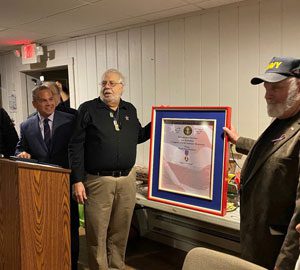
In the middle of May 1967, the Army’s Fourth Infantry Division found itself in one of the most brutal battles of the Vietnam conflict along the Cambodian border. Ernie Boisvert was just three feet away from his lieutenant when a rocket-propelled grenade (RPG) came out of the jungle and rocked their foxhole.
“I watched the RPG float in and hit the corner of our bunker,” Boisvert said.
His lieutenant was caught in the explosion. “He was killed instantly,” said the DAV life member and current Adjutant for the Department of Rhode Island.
Boisvert did not go unscathed. Shrapnel from the blast hit him in the face.
When the battle ended, Boisvert was among the wounded flown via helicopter to a nearby field hospital. At the triage center, a nurse told him they were too overwhelmed with critical patients and they couldn’t get to him.
Boisvert, who’d been patched up going through triage, simply went back to his unit on base—leaving no record of him being wounded. His physical wounds eventually healed, but his trauma lingered.
“I was 20-years-old and single,” Boisvert said. “He was married and I believe had a kid. He had more to live for than I did then. I still have guilt.”
The death of his lieutenant would continue to play on a loop in his head for more than five decades.
“The guys that I served with, we were all drafted together. We all went through training together,” Boisvert said. “I have no siblings and the guys I was with I called my brothers.”
When Boisvert drove to see Al Falcioni, who served alongside him during the battle that wounded Boisvert, Falcioni recognized that Boisvert was struggling with PTSD and encouraged him to get help.
Soon Boisvert was with a psychiatrist, and today he still takes medications for anxiety, depression and sleeping issues.
“I needed some assistance and I went and got it,” Boisvert added.
In 2017, the book “Nine Days in May: The Battles of the 4th Infantry Division on the Cambodian Border, 1967” was published, including a vivid description of the death of Boisvert’s lieutenant told by a soldier in a nearby foxhole.
“If that book hadn’t been written, I wouldn’t have done anything,” Boisvert said. “There was no reference of me be being there. That created a problem for me. It caused me to question if I was even there. I needed to resolve it, I needed something to prove to me that I was there.”
Over the years, Boisvert had remained close with many of his fellow soldiers and at reunions, they pushed him to seek the Purple Heart he deserved.
He would call his friend and fellow soldier, Bill Lomnecki, who recalled seeing Boisvert at the field hospital.
“They were medevacking those guys in like crazy,” Lomnecki said. “I remember he was bleeding. He caught a piece of shrapnel. We were temporarily able to patch his face.”
Lomnecki assumed Boisvert had received a Purple Heart and was “shocked” to find out that he never did.
“He deserved it,” Lomnecki said. “He shed blood for his country.”
Now, with testimony from witnesses, the Department of Defense recently authorized a Purple Heart for Boisvert, who received it during a ceremony on Feb. 1.
Lorraine, Boisvert’s wife of more than 50 years, said the award gave her husband some peace.
“I am proud of him for pursuing this—it has validated his memories,” she said.
“We are blessed and extremely grateful to have such a humble, caring and honorable man as a part of our organization,” said National Adjutant Marc Burgess. “I couldn’t be happier for him to have finally received something he earned and has deserved for so long.”
“I needed closure,” Boisvert said. “The Purple Heart gives me that.”






